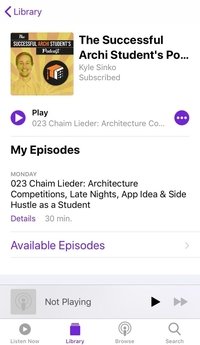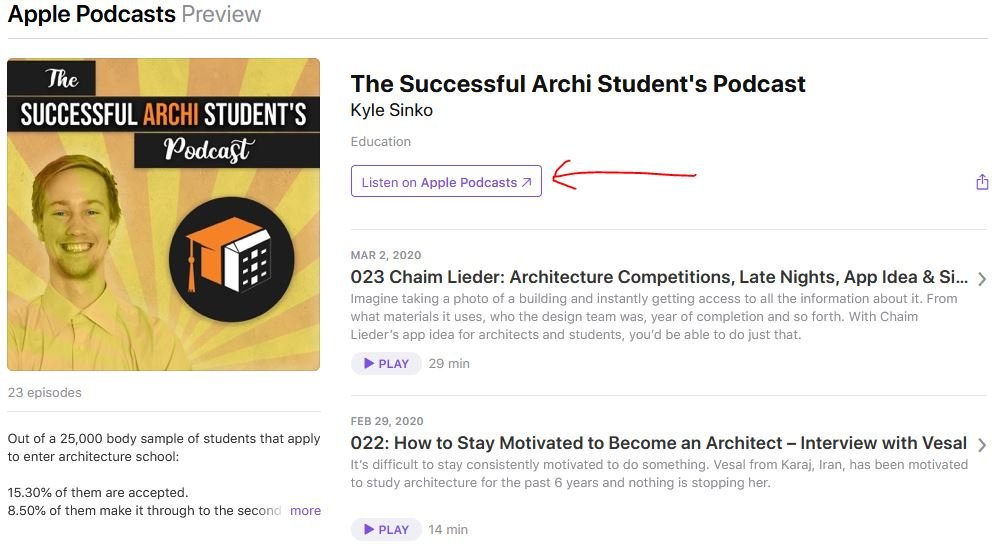How to Save Money as a University or College Student - 4 Money Saving Tips
It’s not financially easy being a student in University or College.
Money comes, and money goes.
The “broke student life” only begins to describe our money situation.
Today, I have 4 tips for you to KEEP MORE OF THAT MONEY coming in by making a few small changes to your student lifestyle!
Get my new ebook! “How to Ace Any Project in Architecture School”
Hey! My name’s Kyle.
From a sample of 25,000 students that applied to enter architecture school:
15.30% of them were accepted.
8.50% of them made it through to the second half of their education.
2.04% of them were awarded a degree in Architecture (post-graduate)
0.78% of them ended up working a job in architecture.
Successful Archi Student is a platform for architecture students to learn off one another to become the LESS THAN 1% of students who end up being successful in the profession.
On the podcast, you’ll hear from practicing architects, other successful students and myself, Kyle, a third year architecture student from South Australia.
Doing so, you’ll learn the tips and tricks to excel past the rest of your cohort and build the skills needed to take your work to another level.
Listen to the Podcast
Or, Stream On:
Read the Podcast
Episode 26 Transcript. How to Save Money as a University or College Student - 4 Money Saving Tips
0:00
This is the Successful Archi Student’s podcast episode 26.
1:02
Now I want to start this off by saying one piece of advice that should end all problems with money. And that is to not buy shit to impress other people. If you’re buying stuff, it should be for your own sake not to impress some random stranger who’s walking down the street now saying that you can still buy things that make you feel good about yourself, but you’ve really got to understand why you’re buying certain things in life. If you’re doing it to impress other people, or if you’re doing it really to satisfy yourself, you know, do you really need that $800 supreme jumper or those $600, Jordans? I buying them for yourself or you’re buying them to impress somebody else? That’s a question you have to ask yourself when it comes to buying things. And that also leads me on to the idea of not buying just useless shit. It’s so often that people will just go out and buy stuff for the sake of buying, you know, they go shopping for the sake of shopping and buying things and it really comes down to minimalism and living within your means. So to not spend money on useless shit and To impress other people, you’re going to be saving yourself tons of money as a student, and it’s really, really, really going to help you invest in your future. The idea of being frugal and minimalistic with the things that you purchase is definitely going to be helpful in that road to saving money and becoming successful with your money. And when it comes to buying things in this day and age, it can be a split second decision. And usually we’re buying on, I guess the idea of emotion and emotion drives our purchasing habits. However, if we can start leading to a more rational way of thinking when we are going shopping, when we are purchasing things online and scrolling through our feeds and finding things, we need to start making that a more rational idea and start giving it a more pragmatic way of thinking when it comes to purchasing things. So really ask yourself, Is it something you need? And is it something that you’re purchasing for yourself, or to impress somebody else?
2:50
Now my next tip for you is to buy secondhand and this could be anything from textbooks to drafting equipment if you’re an architecture student or anything in between anything that you Buy secondhand 90% of the things that you buy secondhand, just as good as something you’re buying brand new. I bought my laptop for $200, which is a $600 laptop and the person had used it. The previous owner had used it for literally six weeks before deciding it wasn’t for them. So I’ve just picked up a brand new laptop, pretty much six weeks old, still with warranty and everything for a third of the price. And it’s not just a laptop. So you can do this with everything or textbooks or equipment that you need for your university or college degree. There was a book that I really wanted to buy and it’s an encyclopedia of architecture and it costs $160 I found it on my local Gumtree. It’s an advertising platform for selling things and buying stuff. And I found this book on there for $60. And so I offered them $40 and we ended up working it out that would I buy it for $50 100 $160 textbook and I bought it for less than a third of the price. The condition of the book was pretty well brand new and there was really no difference between that and a book that you Buying a store. So we always have these students complaining about how expensive textbooks are and pencils, and pens and drafting equipment and motor making equipment, all this stuff, when really, if you buy it secondhand, it’s not that expensive. And if you just put a little bit of time into looking for the best deals, then it’s really going to help you save some money as a student.
4:19
Tip number three is to bring your own food to university or college and to cook for yourself. Just today, I was walking through university and I’m just looking around at all the people who have bought food or lining up to buy food at the cafe area at a university. And they’re spending 10 to $20 just on a single meal. When really you can go home and you can watch the video that’s on the screen here. Actually, I’ll put it up where you can meal prep an entire week’s worth of food for that same price of one meal at university as I went on a site visit two days ago and everyone was buying their own food and go into the local restaurant or McDonald’s and they were spending all this money on their food whereas I just brought my own container With some pasture and stuff in it, and I saved myself $10, just like that. And you might be thinking $10 isn’t that much, but when you think about it in the long term $10 if you invest it at 10% per annum, this is just getting a bit technical here. But over time that $10 is worth a lot more than $10. You know, if you put that $10 into a bank account with a 4% interest rate, then it’s going to be maybe $20,000. In 30 years time, I guess this is just the idea of money compounding over time as an investment. However, if you’re not thinking about it like that, and you’re just thinking about short term, you know, within a week’s time, if you’re spending $10 a day on lunch at university yet $70 that you’re just spending on food, which you could be saving to purchase something that you that you love or to get rid of something that you don’t love in your life. And so I do think it’s really important just to make your own food, go to the grocery shops and do it yourself because it’s going to be saving you a ton of money.
5:55
Now Tip number four is a little bit deeper. It’s about getting you To your financial statements, and cutting out or limiting the things that don’t serve you, or that are a waste of money, because if you’re just going through your daily spendings, and you’re having a look at everything that you’re spending your money on, it might not be obvious as to what is actually consuming all of your money. However, if you actually go through your bank statements, it’s going to be a lot easier to identify those sources that are taking up majority of your money for me, I found out that going out every weekend, and spending money on alcohol and booze and food and all this kind of stuff. Back in the days. Well, this was consuming, you know, 20% of my my weekly income. And it was just a waste of money that I realized I could limit or cut out completely and start saving a lot of money. And so to actually understand what you’re spending your money on isn’t just good to identify those things you can cut out or limit, but just having an idea of what you’re spending your money on is really going to make it a conscious decision then when it comes to purchasing and it’s really going to help with that first idea of buying with your rational thought rather than your emotional thought. So I think it’s a really good idea to understand what you’re spending your money on and actually go through your bank statements or your card statements, just identify, just write out and go over the last 12 months and just understand what you’re actually spending your money on and it’s gonna be really helpful for you I guarantee it.
7:12
So there were just four quick tips about saving money as a student. I really hope you did find them helpful. If you did, please do leave a thumbs up on the video. And if you enjoyed this kind of content, do subscribe to the channel. I post a video every couple of days and if you don’t want to miss out on the content that I put out, make sure you’re subscribed and you click the bell button as well to make sure you don’t miss out on those videos. And finally, if you have any thoughts or suggestions for saving money as a student, make sure you leave a comment and let other students know what your thoughts about this are. Thank you guys so much and I hope to see you in the next video.
I'D LOVE TO HAVE YOU ON THE SHOW!
Have a project you want to delve in to and discuss, or you have some useful tips for other students you think would be helpful?
Please send me an email to kyle@successfularchistudent.com and get in touch about it!
Otherwise, direct message me on Instagram @successfularchistudent and I’ll be keen to set up a skype call.
Resources Mentioned
Join the best community for Architecture students! http://successfularchistudent.com/community/
Ask me a question to get answered on the podcast! http://successfularchistudent.com/community/get-help/
Support the Podcast
My aim is to help other architecture students succeed in their education so they can later on succeed in their profession.
Help me help others by sharing the podcast with your friends!
If you have iTunes on your computer, or the “Podcasts” app on your Apple device, can you please take 1 minute and leave me a quick rating and review?
To do so, just follow the instructions below:
Reviewing on your Apple device
1.) Head to this page: https://podcasts.apple.com/us/podcast/the-successful-archi-students-podcast/id1489266322?uo=4
You should have the Podcasts app already on your phone.
If not, you can download it on the app store for free.
If you are on a computer, please skip to reviewing on a computer.

2) After clicking the link above, the Podcast app will open to this page.

3) Make sure you are subscribed!
4) Scroll down a little bit and leave an honest review of what you think about the podcast for architecture students.
Reviewing on a computer
1.) Head to this page: https://podcasts.apple.com/us/podcast/the-successful-archi-students-podcast/id1489266322?uo=4
Once there, click “Listen on Apple Podcasts”. This will open the podcast in iTunes.
If you don’t have iTunes, you can download it on the app store for free.

2) Scroll down and leave an honest review about the architecture student podcast.
That’s it! Just click submit and you are done!
Thank you so much! I really really really appreciate all the support and your help in getting the Successful Archi Student name out in front of the iTunes audience!
(P.S. If you leave us a review, respond in this thread so I can personally thank you!!)
